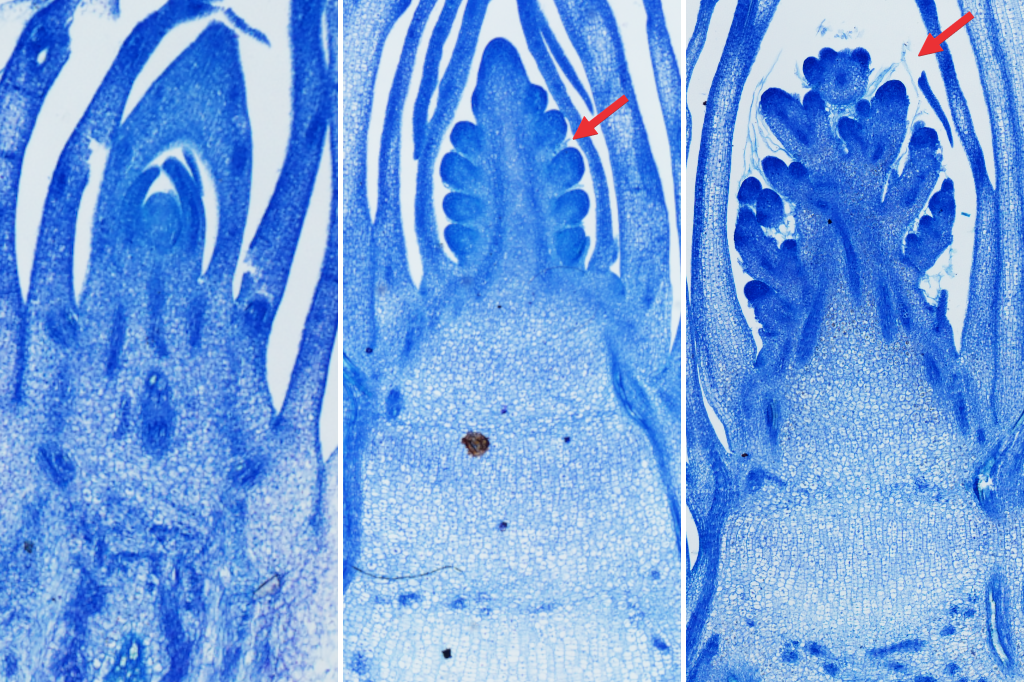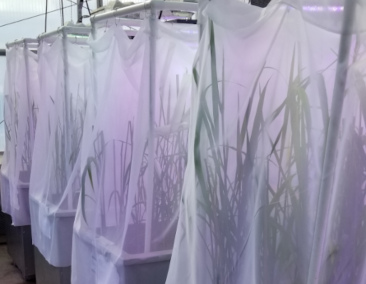The MN Cultivated Wild Rice Council held its annual Wild Rice Symposium. December, 2021.
Kimball program members presented research at the annual MN wild rice symposium, in Grand Rapids, MN. Although the event was smaller than previous years, it was great to speak with the wild rice growers and industry workers. Presentations covered topics including breeding objectives, the use of genomic tools for efficient breeding, the future of dormancy research, the study of diseases affecting wild rice, and the re-structuring of the field-based research program.
Dr. Kimball Gives A Seminar For Cornell. November, 2021.
Dr. Kimball returned (virtually) to Cornell, to give a seminar about northern wild rice. In this seminar she discusses the University of MN wild rice breeding program. Dr. Kimball gives an overview about the history of the program as well as the methods used in the cultivation of northern wild rice. She also describes some of the challenges associated with breeding wild rice and the research that has been and continues to be done to better understand and overcome these challenges.
Dr. Kimball Gives An MAES Seminar. October, 2021.
Dr. Kimball gave a virtual talk for the Minnesota Agricultural Experiment Station project seminar series in May of 2021. These talks are intended to showcase the different agricultural research projects and programs within the University of Minnesota. Here, Dr. Kimball discusses some basics about wild rice, gives an introduction to the wild rice breeding program, and highlights some of the research being done in the program.
Jacques Duquette Is On To His Next Adventure. September, 2021.
Jacques left our program in September of this year. Having been part of the cultivated wild rice breeding program since the time of Dr. Porter, Jacques has been a crucial resource for all of us. When the rest of us joined the program, Jacques was there to teach us all about seed physiology and a whole lot about wild rice in general. We are happy for him in his career change, which will allow him a whole new set of experiences, but we are all going to miss him very much!
Drone Mediated Pesticide Trials. August, 2021.
The wild rice breeding program now has its own drone and certified drone pilots. The drone will be used for pesticide trials in the future. This new method of application will improve the accuracy of application and is a safer alternative to in person sprays. Insecticide trials will assess different formulations for the control of rice worm, a common pest of wild rice. Meanwhile, fungicide trials are ongoing for the management of fungal brown spot, one of the most common diseases of wild rice. The results of these trials will help growers to mitigate yield losses in their fields.
Field Day at the NCROC. July, 2021.
The annual wild rice field day took place at the North Central Research and Outreach Center at the end of July this year. The program was excited to finally see our growers in person after a year of virtual meetings. Despite a couple of thunderstorms rolling in, the event was a success. Growers heard about the results from the past year's research and the program's upcoming research goals.
In Memory of Henry Schumer. May, 2021.
Henry Schumer passed in April of 2021. Henry spent 42 years working at the North Central Research and Outreach Center, ultimately as the wild rice program's research plot coordinator. His work in the breeding program led to the release of multiple successful varieties and significant contributions to the cultivated wild rice industry as a whole. Henry retired in 2018 as a cherished member of the program. He will be missed by a great many people and remembered, in part, for his important contributions to the program.
Histology Work Begins. February, 2021.
Work on histology has begun at the NCROC. This work will allow our team to study how the panicle in wild rice develops and link the timing of this to cumulative growing degree days. In the future we hope to study how agronomic inputs influence this development and how we can use that to maximize yield. During the initial testing we were able to capture a range of timepoints throughout the development of the panicle. The panel of microscopy images on the left (taken by Bruna Bucciarelli) show vegetative tissue (panel 1) and two stages of panicle development (panels 2 and 3). The red arrows point to bract hairs that were also visible.
Pollen Tents Built for Greenhouse Cross-Pollination. January, 2021.
Pollen tents were built for greenhouse tanks, in St. Paul and at the NCROC in Grand Rapids, using PVC and very fine mesh fabric. The tents can easily be moved aside for access to the plants and can be pulled down and cleaned between growing cycles. These tents will allow for the controlled cross-pollination of wild rice plants in the greenhouse, leading to better harvests and healthier plants. We feel these pollen tents will make the growing cycles in our greenhouses more productive, and we are excited to reap the benefits!

